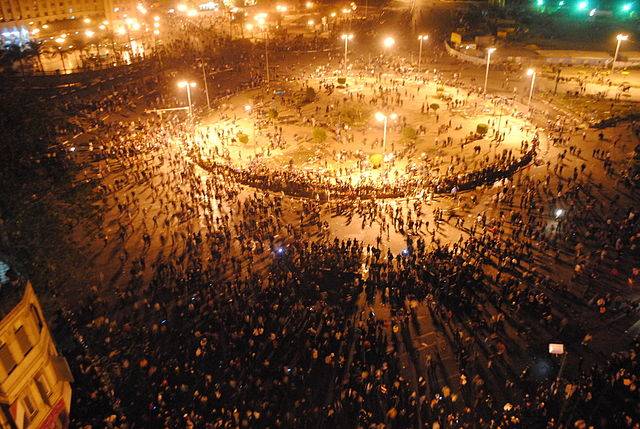I first covered the Arab Spring just over two years ago, and since then, I’ve written about whether the revolutions were a setback for women’s rights, as well as the unresolved tension between democracy and Islamism among Arab populations.
I didn’t report on events in the Middle East very much last year, since I thought there were fewer major developments to cover. It seemed like the worst violence was over, and all that was left was the sausage-making process of democracy, writing new constitutions and hammering out the details of power-sharing. But I’m starting to fear that I was wrong, that the revolutions left big, important questions unsettled, and that renewed political strife has brought several countries to the precipice and risks tipping them back into chaos.
In Tunisia, which seemed like the greatest success story of the Arab Spring, political violence and unrest are surging. Chokri Belaid, the leader of a secular opposition party, was gunned down in broad daylight last week, leading to marches against the ruling Ennahda party. Other secular figures have been attacked as well, according to a report by Amnesty International.
Egypt, too, is threatened by political gridlock and sweltering under nonstop street protests in Cairo and elsewhere, fired by anger that the democratic revolution hasn’t brought the hoped-for changes. In the city of Port Said, there have been violent protests against the government, apparently sparked by a court decision sentencing people to death for their role in a soccer riot, but swelling with a more general sentiment that the city has been neglected by the government and is still being treated brutally by the police. Lawsuits for “insulting the president” have soared in President Mursi’s first few months in office, and a former finance minister has warned that unrest will worsen if the country’s rulers continue to consolidate power rather than seeking economic reforms. (I learned from that article that the revolutionaries’ original slogan was “bread, freedom, social justice”).
Last is Syria, which I fear has become the situation we intervened in Libya to prevent: a bitter, bloody and protracted civil war that leaves the country in ruins, its people as refugees and its institutions shattered. Unlike the other dictators who stepped down or fled in the face of a mass popular uprising, Assad seems determined to hang on to the bitter end. At this point he can’t possibly win the war, and with the fighting creeping steadily toward Damascus, I imagine he must know that, but he’s seemingly trying to kill as many people as he can first – a spiteful “if I go, I’m taking you with me” gesture to his own country.
I wish there were an easy solution to recommend in any of these cases, but I don’t think there is. The most obvious case for outside intervention is Syria, where the NATO countries could at least establish a no-fly zone – but even if we did that, a long battle lies ahead between the revolutionaries and Assad’s loyalists. Even if Assad’s government fell tomorrow, the people of Syria would still have to create a new government, and there’s no reason to believe that would be any simpler or less fraught than it’s proving to be in the other Arab nations.
I’ve said it before, but it bears repeating: democracy is very, very hard to get right. The United States labored for years under the ultimately failed Articles of Confederation before adopting the Constitution, and even that more successful document was still the subject of bitter disputes, power struggles, and one full-blown civil war. Many other modern democracies went through similar convulsions. Especially in countries that have long been under the heel of dictatorship, where violence and intimidation were accepted facts of life, it’s too optimistic to expect that they can avoid the same power struggles. But the rule of the gun, if it goes on for long, can only lead to anarchy. There’s little that us outsiders can do about it now. The people of the Arab nations need to take a stand against it themselves. They’ve taken their destiny into their own hands, which includes the freedom to stumble and to fail; the world can only watch and hope they make the right choices.
Image: Protests in Tahrir Square, Cairo, in November 2012 in response to a constitutional decree by Egyptian President Mohammed Morsi eliminating judicial oversight of executive decisions. That edict was later revoked. Photo by Lilian Wagdy, released under CC BY 2.0 license; via Wikinews.
